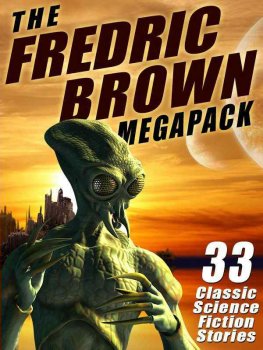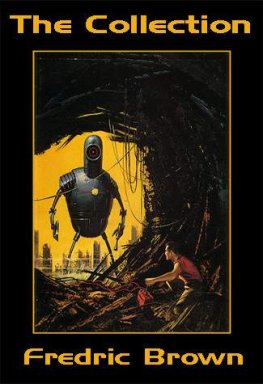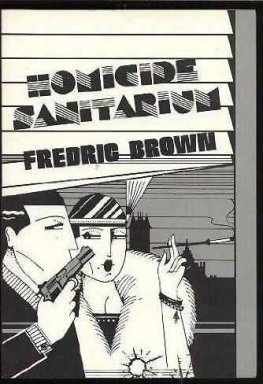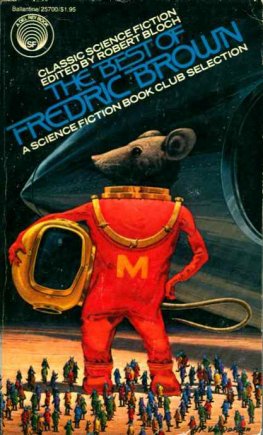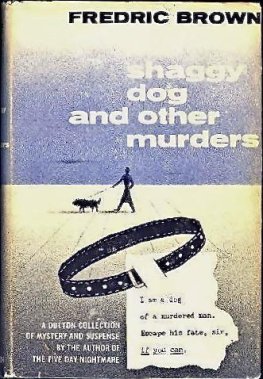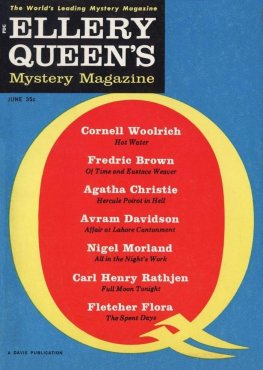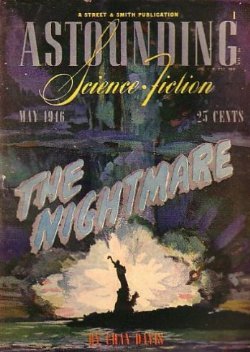Fredric Brown - Letter to a Phoenix
Here you can read online Fredric Brown - Letter to a Phoenix full text of the book (entire story) in english for free. Download pdf and epub, get meaning, cover and reviews about this ebook. year: 1949, publisher: Street & Smith Publications, Inc., genre: Science fiction. Description of the work, (preface) as well as reviews are available. Best literature library LitArk.com created for fans of good reading and offers a wide selection of genres:
Romance novel
Science fiction
Adventure
Detective
Science
History
Home and family
Prose
Art
Politics
Computer
Non-fiction
Religion
Business
Children
Humor
Choose a favorite category and find really read worthwhile books. Enjoy immersion in the world of imagination, feel the emotions of the characters or learn something new for yourself, make an fascinating discovery.

- Book:Letter to a Phoenix
- Author:
- Publisher:Street & Smith Publications, Inc.
- Genre:
- Year:1949
- Rating:3 / 5
- Favourites:Add to favourites
- Your mark:
- 60
- 1
- 2
- 3
- 4
- 5
Letter to a Phoenix: summary, description and annotation
We offer to read an annotation, description, summary or preface (depends on what the author of the book "Letter to a Phoenix" wrote himself). If you haven't found the necessary information about the book — write in the comments, we will try to find it.
Letter to a Phoenix — read online for free the complete book (whole text) full work
Below is the text of the book, divided by pages. System saving the place of the last page read, allows you to conveniently read the book "Letter to a Phoenix" online for free, without having to search again every time where you left off. Put a bookmark, and you can go to the page where you finished reading at any time.
Font size:
Interval:
Bookmark:
Letter to a Phoenix
by Fredric Brown
There is much to tell you, so much that it is difficult to know where to begin. Fortunately, I have forgotten most of the things that have happened to me. Fortunately, the mind has a limited capacity for remembering. It would be horrible if I remembered the details of a hundred and eighty thousand yearsthe details of four thousand lifetimes that I have lived since the first great atomic war.
Not that I have forgotten the really great moments. I remember being on the first expedition to land on Mars and the third to land on Venus. I rememberI believe it was in the third great warthe blasting of Skora from the sky by a force that compares to nuclear fission as a nova compares to our slowly dying sun. I was second in command on a Hyper-A Class spacer in the war against the second extragalactic invaders, the ones who established bases on Jupes moons before we knew they were there and almost drove us out of the Solar System before we found the one weapon they couldnt stand up against. So they fled where we couldnt follow them, then, outside of the Galaxy. When we did follow them, about fifteen thousand years later, they were gone. They were dead three thousand years.
And this is what I want to tell you aboutthat mighty race and the othersbut first, so that you will know how I know what I know, I will tell you about myself.
I am not immortal. There is only one immortal being in the universe; of it, more anon. Compared to it, I am of no importance, but you will not understand or believe what I say to you unless you understand what I am.
There is little in a name, and that is a fortunate thingfor I do not remember mine. That is less strange than you think, for a hundred and eighty thousand years is a long time and for one reason or another I have changed my name a thousand times or more. And what could matter less than the name my parents gave me a hundred and eighty thousand years ago?
I am not a mutant. What happened to me happened when I was twenty-three years old, during the first atomic war. The first war, that is, in which both sides used atomic weaponspuny weapons, of course, compared to subsequent ones. It was less than a score of years after the discovery of the atom bomb. The first bombs were dropped in a minor war while I was still a child. They ended that war quickly, for only one side had them.
The first atomic war wasnt a bad onethe first one never is. I was lucky for, if it had been a bad oneone which ended a civilizationId not have survived it despite the biological accident that happened to me. If it had ended a civilization, I wouldnt have been kept alive during the sixteen-year sleep period I went through about thirty years later. But again I get ahead of the story.
I was, I believe, twenty or twenty-one years old when the war started. They didnt take me for the army right away because I was not physically fit. I was suffering from a rather rare disease of the pituitary glandSomebodys syndrome. Ive forgotten the name. It caused obesity, among other things. I was about fifty pounds overweight for my height and had little stamina. I was rejected without a second thought.
About two years later my disease had progressed slightly, but other things had progressed more than slightly. By that time the army was taking anyone; theyd have taken a one-legged one-armed blind man if he was willing to fight. And I was willing to fight. Id lost my family in a dusting, I hated my job in a war plant, and I had been told by doctors that my disease was incurable and I had only a year or two to live in any case. So I went to what was left of the army, and what was left of the army took me without a second thought and sent me to the nearest front, which was ten miles away. I was in the fighting one day after I joined.
Now I remember enough to know that I hadnt anything to do with it, but it happened that the time I joined was the turn of the tide. The other side was out of bombs and dust and getting low on shells and bullets. We were out of bombs and dust, too, but they hadnt knocked out all of our production facilities and wed got just about all of theirs. We still had planes to carry them, too, and we still had the semblance of an organization to send the planes to the right places. Nearly the right places, anyway; sometimes we dropped them too close to our own troops by mistake. It was a week after Id got into the fighting that I got out of it againknocked out of it by one of our smaller bombs that had been dropped about a mile away.
I came to, about two weeks later, in a base hospital, pretty badly burned. By that time the war was over, except for the mopping up, and except for restoring order and getting the world started up again. You see, that hadnt been what I call a blow-up war. It killed offIm just guessing; I dont remember the fractionabout a fourth or a fifth of the worlds population. There was enough productive capacity left, and there were enough people left, to keep on going; there were dark ages for a few centuries, but there was no return to savagery, no starting over again. In such times, people go back to using candles for light and burning wood for fuel, but not because they dont know how to use electricity or mine coal; just because the confusions and revolutions keep them off balance for a while. The knowledge is there, in abeyance until order returns.
Its not like a blow-up war, when nine-tenths or more of the population of Earthor of Earth and the other planets is killed. Then is when the world reverts to utter savagery and the hundredth generation rediscovers metals to tip their spears.
But again I digressed. After I recovered consciousness in the hospital, I was in pain for a long time. There were, by then, no more anesthetics. I had deep radiation burns, from which I suffered almost intolerably for the first few months until, gradually, they healed. I did not sleepthat was the strange thing. And it was a terrifying thing, then, for I did not understand what had happened to me, and the unknown is always terrifying. The doctors paid little heedfor I was one of millions burned or otherwise injuredand I think they did not believe my statements that I had not slept at all. They thought I had slept but little and that I was either exaggerating or making an honest error. But I had not slept at all. I did not sleep until long after I left the hospital, cured. Cured, incidentally, of the disease of my pituitary gland, and with my weight back to normal, my health perfect.
I didnt sleep for thirty years. Then I did sleep, and I slept for sixteen years. And at the end of that forty-six-year period, I was still, physically, at the apparent age of twenty-three.
Do you begin to see what had happened as I began to see it then? The radiationor combination of types of radiationI had gone through, had radically changed the functions of my pituitary. And there were other factors involved. I studied endocrinology once, about a hundred and fifty thousand years ago, and I think I found the pattern. If my calculations were correct, what happened to me was one chance in a great many billions.
The factors of decay and aging were not eliminated, of course, but the rate was reduced by about fifteen thousand times. I age at the rate of one day every forty-five years. So I am not immortal. I have aged eleven years in the past hundred and eighty millennia. My physical age is now thirty-four.
And forty-five years is to me as a day. I do not sleep for about thirty years of itthen I sleep for about fifteen. It is well for me that my first few days were not spent in a period of complete social disorganization or savagery, else I would not have survived my first few sleeps. But I did survive them and by that time I had learned a system and could take care of my own survival. Since then, I have slept about four thousand times, and I have survived. Perhaps someday I shall be unlucky. Perhaps someday, despite certain safeguards, someone will discover and break into the cave or vault into which I seal myself, secretly, for a period of sleep. But it is not likely. I have years in which to prepare each of those places and the experience of four thousand sleeps back of me. You could pass such a place a thousand times and never know it was there, nor be able to enter if you suspected.
Font size:
Interval:
Bookmark:
Similar books «Letter to a Phoenix»
Look at similar books to Letter to a Phoenix. We have selected literature similar in name and meaning in the hope of providing readers with more options to find new, interesting, not yet read works.
Discussion, reviews of the book Letter to a Phoenix and just readers' own opinions. Leave your comments, write what you think about the work, its meaning or the main characters. Specify what exactly you liked and what you didn't like, and why you think so.

